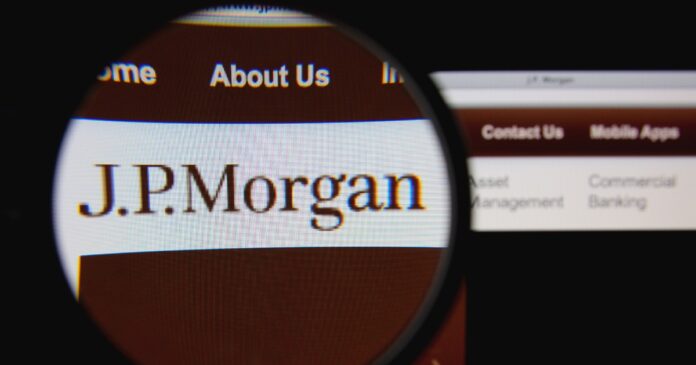JPMorgan Chase & Co has successfully conducted its first live trade on a public blockchain.
Through the trade, the multinational bank was able to issue tokenised $71,000. It was part of the Singapore central bank’s pilot programs that are testing the use of decentralised finance (DeFi) in the banking sector. Following that trade, JPMorgan traded it for tokenised yen with Japan’s SBI Digital Asset Holdings.
It signifies a big step towards entering the system that operates the world of cryptocurrencies and showcases the potential for other global banks to follow in its footsteps.
Other banks such as DBS Bank Ltd., Standard Chartered PLC and HSBC Holdings Plc are also part of the pilot testing rounds for JPMorgan’s live trade on a public blockchain.
This is not JPMorgan’s first use of blockchain technology to conduct transactions.
On May 20, JPMorgan Chase used cryptocurrency tokens for collateral in traditional financial asset transactions for the first time.
Even though the live trade transaction was not for cryptocurrencies, the infrastructure used to execute the test was developed by crypto firms, the Polygon blockchain. JPMorgan used Polygon as it makes transactions on the Ethereum blockchain cheaper and a modified version of Aave, a major DeFi lending project.
Tyrone Lobban, head of Blockchain Launch and Onyx Digital Assets at JPMorgan, told Bloomberg, “today was the first step to show that we can actually trade on these public networks,” adding that “the future is really working toward scaling this pivotal moment.”
Prior to JPMorgan’s successful completion of the live trade, several other Wall Street institutions have been exploring the use of blockchain. Test and research for businesses to use the blockchain have been ongoing, especially for intraday repurchase – a sort of short-term borrowing in fixed income – and cross-border trades.
However, current efforts by banks are typically based on private blockchains that need users to receive permission to join.
According to Bloomberg, the use of public blockchains can eliminate challenges such as isolated or fragmented liquidity, which will provide the public access to the infrastructure.
In the interview with Bloomberg, Lobban added, “we clearly see what’s happening in the public domain, and we can see how the innovation is creating not only new ways of doing financial transactions but new types of products as well.”
He added that the bank plans to explore using other blockchain networks in the future.
In May, JPMorgan announced that the bank would use blockchain technology in the collateral settlement, planning to expand to other asset types such as equities and fixed income, according to Bloomberg.
Two of the bank’s entities are using tokens of BlackRock money market fund shares as collateral on their private blockchains, allowing trading outside of market hours.
To date, the bank has processed more than $300 billion in repo transactions using blockchain.
In addition to being used for derivatives, repo transactions, securities lending, and other transactions, a blockchain-based collateral settlement will also expand the application scope of tokenised collateral, providing investors with a wider variety of assets to invest as collateral.
Image source: Shutterstock
Credit: Source link






















 Bitcoin
Bitcoin  Ethereum
Ethereum  XRP
XRP  Tether
Tether  Solana
Solana  USDC
USDC  Dogecoin
Dogecoin  Cardano
Cardano  Lido Staked Ether
Lido Staked Ether  TRON
TRON  Wrapped Bitcoin
Wrapped Bitcoin  Chainlink
Chainlink  Wrapped stETH
Wrapped stETH  Avalanche
Avalanche  Sui
Sui  Stellar
Stellar  Litecoin
Litecoin  Toncoin
Toncoin  Shiba Inu
Shiba Inu  Hedera
Hedera  LEO Token
LEO Token  USDS
USDS  Hyperliquid
Hyperliquid  Polkadot
Polkadot  WETH
WETH  MANTRA
MANTRA  Bitcoin Cash
Bitcoin Cash  Bitget Token
Bitget Token  Ethena USDe
Ethena USDe  Wrapped eETH
Wrapped eETH  Uniswap
Uniswap  Monero
Monero  NEAR Protocol
NEAR Protocol  Pepe
Pepe  WhiteBIT Coin
WhiteBIT Coin  Aave
Aave  Bittensor
Bittensor  Ondo
Ondo  Aptos
Aptos  Internet Computer
Internet Computer  Dai
Dai  Official Trump
Official Trump  Ethereum Classic
Ethereum Classic  Mantle
Mantle  Tokenize Xchange
Tokenize Xchange  OKB
OKB  Gate
Gate  sUSDS
sUSDS  Sonic (prev. FTM)
Sonic (prev. FTM) 
